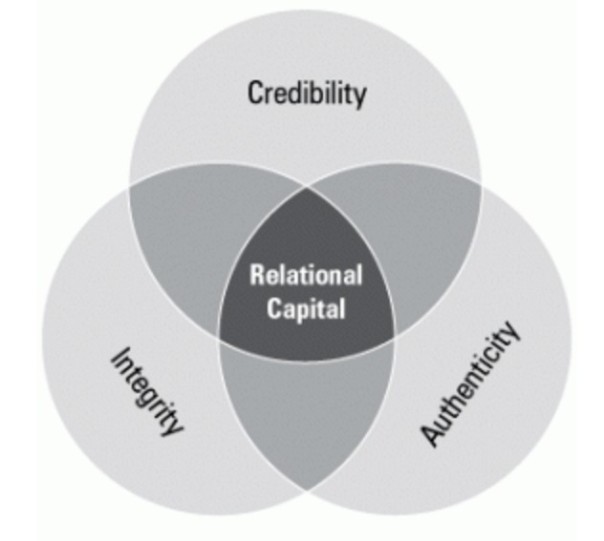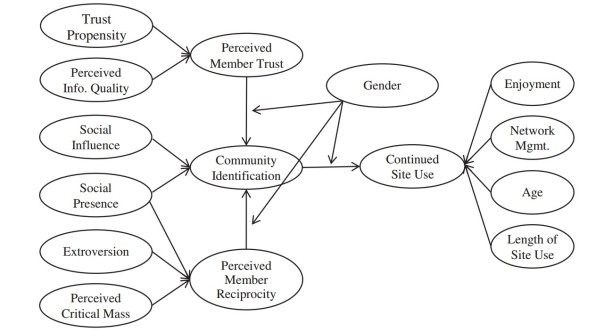Youtube video 1. The power of relational capilta
Definition
Relational capital is one of the three primary components of intellectual capital and is the value inherent in a company’s relationships with its customers, competitors, and other external stakeholders. It should be noted here that while ACAP recognises the value of new, external information, assimilate it and apply it to commercial ends (Cohen & Levinthal, 1990; Zahra & George, 2002), T-knowledge is ‘knowledge’ about organisational technologies such as administrative and communication tools, as well as best practices for operationalising these technologies (Nohria & Gulati, 1996; Sharma, 2000). Because relational capital depends on both external connectivity and technological networks, ACAP and T-knowledge are two different routes to interpret the meaning of the external knowledge and to exploit it to improve customer service (Cano Vieira et al. 2016).

Figure 1 The Essential Qualities of Relational Capital
You can use relational capital in many ways. There are lots of different researches of what does relational capital effect on companies and its employees.
“How does gender affect the impact of relational capital on member continued internet-site use?”
Facebook were set as research context for two reasons. First, it is by far the largest SNS in the world and it offers an ideal platform to understand SNS. Facebook has 1.59 billion monthly active users [18], which far exceeds WhatsApp (500 million), Twitter (284 million), and Instagram (200 million). Second, we are able to isolate the potential confounding effects from site-specific factors by focusing on one but not multiple SNS (Chen et al. 2016).

Figure 2. Conceptual research model
In Figure 2., is presented the conceptual research model which advocates the roles of relational capital in explaining members’ site use behaviour. Relational capital is argued to be shaped by various factors that stem from individual traits (e.g., trust propensity), qualities of the online community (e.g., information quality), website design (e.g., social presence), and social norms (e.g., social influence). These antecedents are informed by the supporting literature because SCT underscores the relational capital but does not prescribe its formation. Relational capital is posited to encourage members with respect to their site use behaviour. The model recognizes gender as a differential factor that affects the impact of relational capital on member behaviour. To isolate the unique effects of relational capital, the model also controls for the likely impacts of several relevant constructs on onsite use (Chen et al. 2016).
The role of formal and informal structures in shaping the corporation’s relational capital
The increase of the company’s relational capital will also be affected by the degree of the company’s involvement in the “Social Responsibility of Business,” participation in various activities for the benefit of the local community or a national cause, e.g. in the activities of the “Great Orchestra of Christmas Charity” etc (Haber 2014).
This example indicates how we can use the company’s formal structure to build relational capital through regular acquisition of such stakeholders as customers, contractors, suppliers, local community members etc., always acting in accordance with regulations and procedures. The means applied here include a system of such legal incentives as have been specified in the company’s regulations, e.g. sponsoring, discounting, coupons, attractive service packages etc. That example indicates that when acting within our organization or the formal structure of our management system, we can legally stimulate our company’s relational capital development in a positive sense. The informal structures developing as a result of the network of personal relationships existing in the hierarchy of workers and stakeholders often present a basis for shaping the company’s relational capital (Haber 2014).
Based on networking, relational capital allows us to start and strengthen business contacts, assuring continuous substantive development of the company. Therefore, we can conclude that relational capital is the company’s intangible asset; positive effects of its application have specific material dimension and they clearly influence the company’s market value (Haber 2014).
Relational Capital in Start-Up Firms
The impact of relational capital on a new business venture is determined by everything related to its environment that can contribute value to the organization. Here, the role of the entrepreneur is critical when establishing and developing the firm’s external relations, with the entrepreneur’s personal network, more often than not, converging with the business network (Hormiga et al. 2011).
Studies has highlighted the important role that relational capital plays in the firms analysed. In general, the results of our analysis stress the importance of the value added by those assets whose specific nature is explained in terms of the relationships established by the firm with its environment. Thus, the reputation that a start-up company can create for itself in the first few years of business has a great impact on its short-term success. By beginning to win customer loyalty, and by ensuring that these customers are prepared to recommend the firm and to repeat their purchases, has a positive impact on the success of the new organization. In addition to the positive impact that this asset has on current and potential customers, building a good reputation can have a decisive effect on the rest of the stakeholders, including suppliers and financial entities (Hormiga et al. 2011).
References
Cano Vieira, C, Briones-Peñalver, A, & Cegarra-Navarro, J 2015, ‘Absorptive Capacity and Technology Knowledge: Enhancing Relational Capital’, Knowledge & Process Management, 22, 4, pp. 305-317, Business Source Complete, EBSCOhost, viewed 15 October 2016.
Figure 1. http://www.relationalcapitalgroup.com/solutions/applications/rq-pro/relational-capital-refresher/
Chen, R, Sharma, S, & Raghav Rao, H 2016, ‘Members’ site use continuance on Facebook: Examining the role of relational capital’, Decision Support Systems, 90, pp. 86-98, Business Source Complete, EBSCOhost, viewed 15 October 2016.
Hormiga, E, Batista-Canino, R, & Sánchez-Medina, A 2011, ‘The Impact of Relational Capital on the Success of New Business Start-Ups’, Journal Of Small Business Management, 49, 4, pp. 617-638, Business Source Complete, EBSCOhost, viewed 15 October 2016.